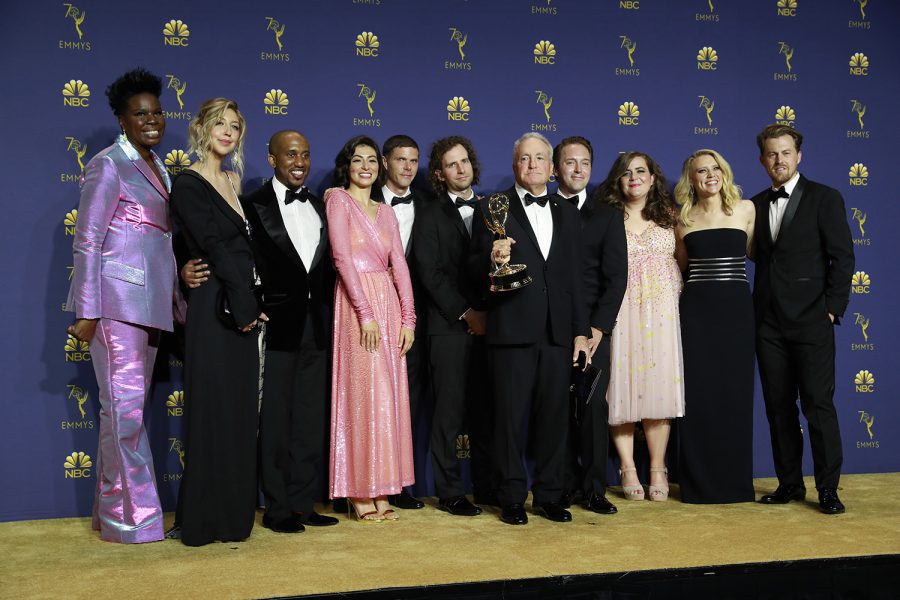No laughing matter: UI professor weighs in on the politically correct comedy debate
Professor Megan Gogerty gives historical and cultural context to the PC comedy debate and explains why offensive humor isn’t as bold amid today’s events as some comedians claim.
Lorne Michaels and SNL cast backstage during the 70th Primetime Emmy Awards at the Microsoft Theater in Los Angeles on Monday, Sept. 17, 2018. (Allen J. Schaben/Los Angeles Times/TNS)
September 26, 2019
After Saturday Night Live’s decision to fire Shane Gillis last week for his use of a racial slur, the topic of what’s acceptable in comedy today has been heavily debated online.
While some say cancel culture and political correctness is killing comedy, others believe that jokes based on harmful stereotypes have no place in humor to begin with. University of Iowa Theater Professor Megan Gogerty takes the latter stance.
Gogerty teaches a comedy course at the UI titled “Stand-up Comedy Practicum.” The course allows students to analyze master comedians and classic joke structure before creating their own stand-up routines.
Gogerty has also participated in several open-mic nights and has opened for a handful of professional comedians, including Cameron Esposito and Louie Anderson. Her study of comedy inside and outside the classroom has led her to some significant conclusions about its nature.
Gogerty said comedy serves a social function.
“We tell jokes as a way of connecting with each other,” Gogerty said. “When I tell a joke and you laugh at that joke, it signals that you agree with me.”
Gogerty said that in the social world, there are two types of transgressions: malignant and benign. She said a benign transgression is harmless, but unusual, such as facing backwards in an elevator. A malignant one, on the other hand, is harmful.
“Culture happens at the speed of light, so a joke that we used to think was benign, and bonded us together — the teller and the laugher — is now malignant due to cultural shifts,” Gogerty said. “When that changes, the joke ceases to be funny.”
Gogerty says this concept has been demonstrated several times throughout history. She used the example of minstrel shows in the 1840s to make her point, which were performances featuring actors in blackface. At the time, such shows were widely considered both humorous and harmless.
“The question is, Is it harmless for a white man to make ching-chong jokes in 2019? If you think it is harmless, one might feel him getting kicked of SNL was overblown,” Gogerty said. “But if you think it’s harmful and perpetuating racist stereotypes, then not so much.”
And that’s where the debate lies — and where it’s always been, for that matter. Gogerty said there were plenty of people offended by minstrel shows in the 1840s, but they didn’t have the opportunity to voice their opinion in the way that people do today.
“We’re hearing from traditionally marginalized voices in ways we’ve never heard before,” Gogerty said.
This has caused an unprecedentedly fast cultural shift, which, consequently, has caused a growing number of people to denounce being politically correct, she said.
“Bill Maher had a show in 1992 called Politically Incorrect. He took pride in saying the things he’s not supposed to say,” Gogerty said. “But the reason he’s not supposed to say it is because of the successful advocacy of basic human rights. Reactionary comedy is often about re-establishing the status quo.”
Gogerty also addressed cancel culture, and what it means for Shane Gillis and other “cancelled” comedians’ careers.
“The consequence is that he got fired from SNL, but he’s not dead,” she said. “He’s still performing. In fact, he stands to make more money now than he did when [he] was in SNL, because he’s become a folk hero for folks who feel uncomfortable with the way our society is changing.”



